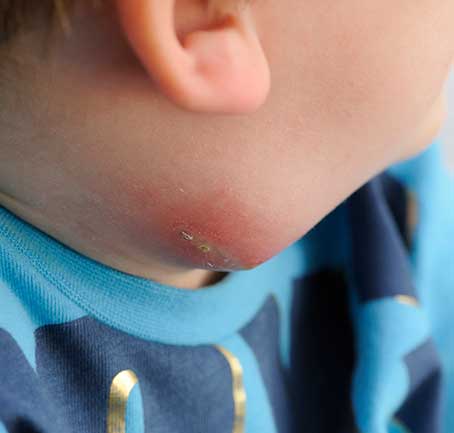About abscesses or boils
A skin abscess or boil is a build-up of pus in the skin.
Abscesses and boils are caused by infections, usually by bacteria, which get into the skin through abrasions or cuts or around hair follicles. The pus forms when the body tries to fight the infection. The pus is made up of the bacteria, white blood cells that fight the bacteria, and dead tissue.
Sometimes a skin abscess might be caused by an infection from a fungus or virus.
An abscess is more likely to develop if things like dirt or rocks are left in a cut or abrasion.
It’s rare for children with healthy immune systems to get boils or abscesses. Children with medical conditions like type-1 diabetes, type-2 diabetes and obesity, and children who have weakened immune systems, are more likely to get abscesses.
Symptoms of abscesses or boils
Abscesses most often come up on the face, neck, armpits, groin and buttocks. But they can develop in any part of the body.
At first, you might notice a small, tender, inflamed lump, like a pimple. On children with dark skin, the lump might look brown, purple or grey. On children with light skin, the lump might look red. Over the next few days, the lump might get larger and more painful. Pus might build up under the surface. The surrounding skin can also get inflamed.
After several days, the abscess usually comes closer to the skin’s surface, and you might see a tiny opening in the middle of it. At this stage, the abscess will either burst naturally or need to be lanced and drained by your GP. After the abscess has opened, it won’t be as painful and should start to heal quickly.
Sometimes your child might get tender and swollen lymph glands near the abscess. Your child might get a fever too.

Medical help: when to get it for children with abscesses or boils
Most small abscesses burst and drain without needing treatment by a nurse or doctor.
But you should take your child to see your GP or go to a hospital emergency department if the abscess:
- doesn’t burst naturally within 5 days
- is very painful and growing quickly.
Your child also needs medical attention if they:
- get a fever, uncontrollable shaking, drowsiness, poor appetite or decreased wet nappies – these could be signs of a serious blood infection
- keep getting abscesses or get scars after an abscess – these could be signs of an underlying skin condition, which can be treated
- have bad eczema, which can make abscesses more severe.
Your doctor will take a swab of the pus to try to work out what germ has caused it.
Treatment of abscesses or boils
Treatment of abscesses or boils depends on how bad they are.
Small abscesses
You can treat small abscesses at home:
- Clean the skin daily in the shower or bath with a soap-free wash or gentle antibacterial wash. You could also try bleach baths, which can reduce bacteria on the skin.
- Cover the abscess with an absorbent dressing after washing the skin. Change the dressing daily.
- Avoid squeezing the abscess because it will be extremely painful for your child. It can also spread infection to other parts of the body, including the blood.
- Prevent your child from doing strenuous activities, because this might slow down abscess healing.
- Wash your hands and your child’s hands regularly to prevent the germs spreading.
Severe abscesses
If your child’s abscess hasn’t burst naturally or is growing quickly, your GP will lance it with sterile equipment to allow the pus to drain out. You shouldn’t try lancing your child’s abscess yourself at home.
Some children might be prescribed antibiotics to take at home or antibiotic ointment or gel to apply around the area at home.
In rare cases, children who are very sick or who have deep or large abscesses might need to go to hospital. They might need to have antibiotics directly into a vein through a drip, or they might need surgery on the abscess.
Pain medicine like paracetamol or ibuprofen might help your child to feel more comfortable. Use these medicines according to the instructions on the packet.
Frequent abscesses: what to do
If your child gets abscesses or boils frequently, see your GP.
Your GP might prescribe an antibiotic ointment or antibacterial wash for your child and your whole household to apply on the skin and in the nose.
This helps prevent future abscesses by reducing Staphylococcus aureus in your household. This is the bacteria that commonly causes abscesses and is often found in your nostrils, armpits and groin.